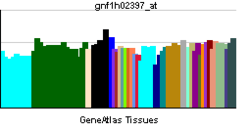Bromodomain and WD repeat-containing protein 3
| BRWD3 | ||||||
|---|---|---|---|---|---|---|
| Identifiers | ||||||
| Aliases | BRWD3, BRODL, MRX93, bromodomain and WD repeat domain containing 3 | |||||
| External IDs | MGI: 3029414 HomoloGene: 18736 GeneCards: BRWD3 | |||||
| RNA expression pattern | ||||||
   | ||||||
| More reference expression data | ||||||
| Orthologs | ||||||
| Species | Human | Mouse | ||||
| Entrez | ||||||
| Ensembl | ||||||
| UniProt | ||||||
| RefSeq (mRNA) | ||||||
| RefSeq (protein) | ||||||
| Location (UCSC) | Chr X: 80.67 – 80.81 Mb | Chr X: 108.74 – 108.83 Mb | ||||
| PubMed search | [1] | [2] | ||||
| Wikidata | ||||||
| View/Edit Human | View/Edit Mouse |
Bromodomain and WD repeat-containing protein 3 is a protein that in humans is encoded by the BRWD3 gene.[3][4][5]
Function
The protein encoded by this gene contains a bromodomain and several WD repeats. It is thought to have a chromatin-modifying function, and may thus play a role in transcription.[5]
Clinical significance
Mutations in this gene can cause mental retardation or permanent paralysis X-linked type 93, which is also referred to as mental retardation X-linked with macrocephaly. This gene is also associated with translocations in patients with B-cell chronic lymphocytic leukemia.[5]
References
- ↑ "Human PubMed Reference:".
- ↑ "Mouse PubMed Reference:".
- ↑ Kalla C, Nentwich H, Schlotter M, Mertens D, Wildenberger K, Dohner H, Stilgenbauer S, Lichter P (Dec 2004). "Translocation t(X;11)(q13;q23) in B-cell chronic lymphocytic leukemia disrupts two novel genes". Genes Chromosomes Cancer. 42 (2): 128–43. doi:10.1002/gcc.20131. PMID 15543602.
- ↑ Muller P, Kuttenkeuler D, Gesellchen V, Zeidler MP, Boutros M (Aug 2005). "Identification of JAK/STAT signalling components by genome-wide RNA interference". Nature. 436 (7052): 871–5. doi:10.1038/nature03869. PMID 16094372.
- 1 2 3 "Entrez Gene: BRWD3 bromodomain and WD repeat domain containing 3".
Further reading
- Field M, Tarpey PS, Smith R, et al. (2007). "Mutations in the BRWD3 Gene Cause X-Linked Mental Retardation Associated with Macrocephaly". Am. J. Hum. Genet. 81 (2): 367–74. doi:10.1086/520677. PMC 1950797
 . PMID 17668385.
. PMID 17668385. - Olsen JV, Blagoev B, Gnad F, et al. (2006). "Global, in vivo, and site-specific phosphorylation dynamics in signaling networks". Cell. 127 (3): 635–48. doi:10.1016/j.cell.2006.09.026. PMID 17081983.
This article incorporates text from the United States National Library of Medicine, which is in the public domain.
This article is issued from Wikipedia - version of the 6/8/2016. The text is available under the Creative Commons Attribution/Share Alike but additional terms may apply for the media files.